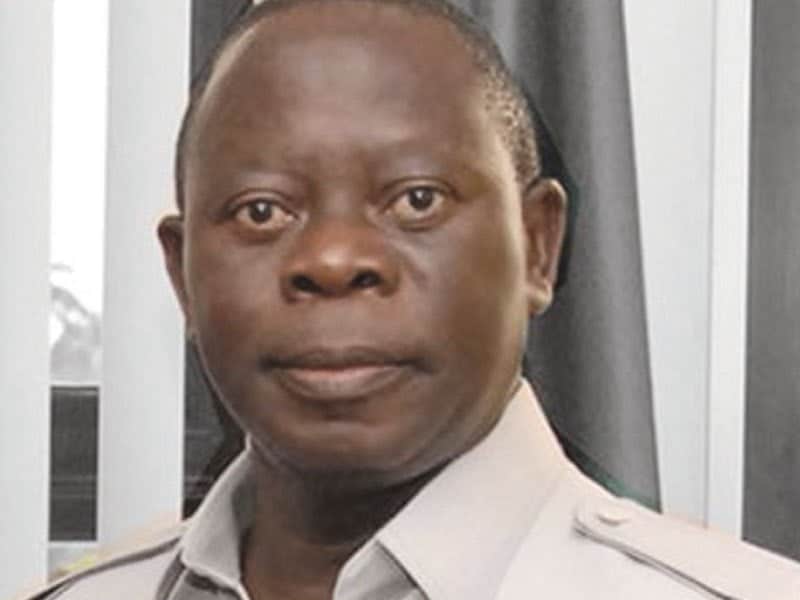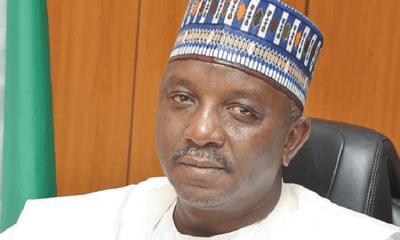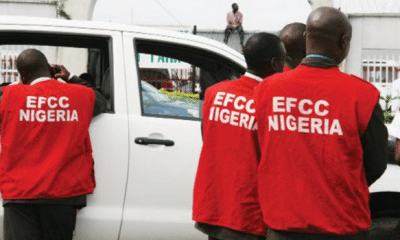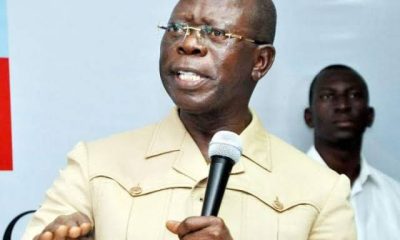Nigeria News
EFCC Speaks On Why It Can’t Arrest Or Prosecute Oshiomhole

The Economic and Financial Crimes Commission, EFCC, has given reasons for its inability to arrest and prosecute APC national chairman, Adams Oshiomhole.
Naija News understands that the anti-graft agency is challenging the jurisdiction of the Federal High Court in Abuja to compel it to arrest and prosecute Oshiomhole, over allegation that he diverted public funds to his personal use while in office as governor of Edo state.
Breakdown Of How Politicians 'Bribed' Oshiomhole In Dollars.
According to report, $17 million is what Oshiomhole allegedly received as bribe from Zamfara: $10 million for him, $7 million shared between Farouk Adamu pic.twitter.com/ihzEj6d8vF— Usman Okai A (@Austinokai) November 15, 2018
EFCC admitted that it has received petitions accusing the All Progressives Congress, APC, National Chairman of complicity in acts of corruption, but added that it was not under any obligation to report or give account of its investigations to any individual or under a timeline within which to carry out its functions.
The anti-graft agency, therefore, urged the high court to dismiss the suit that is seeking to invoke an order of mandamus to compel it to initiate criminal proceedings against the embattled APC Chairman.
The suit marked FHC/ABJ/CS/628/2018, was filed before the court by Edo State based cleric and activist, Bishop Osadolor Ochei.
The cleric wants the court to declare that EFCC has a statutory duty to investigate different petitions that contained allegations of financial recklessness against Oshiomhole.
The pastor told the court that Oshiomhole who was sued as the 2nd respondent, while in office as Edo state governor, acquired properties in United States of America, South Africa and Dubai worth billions of U.S. dollars and far in excess of his legitimate income.
He alleged before the court that Oshiomhole built a sprawling mansion worth more than N10billion in his home town known as Iyamho, while in office.
The pastor told the court that “The said building was constructed by Verissimo, a South African Architectural outfit. The said house of the 2nd respondent has swimming pools, water fountains, multiple theatres for cinema and live performances, huge event halls, bridges, manmade lake, lodges of different sizes amongst others.
EXCLUSIVE: How Shehu Sani's Senatorial Ticket Was 'Sold For $2m' To Oshiomhole Through Farouk Adamu | Sahara Reporters https://t.co/vGc7wJDiZ5#ShameOnAPC pic.twitter.com/L6OpH6n47V
— PDP Vanguard (@PDPVanguard) November 16, 2018
“The said cost of building the mansion is well outside the 2nd Respondent’s legitimate income. The 2nd Respondent’s lifestyle and extent of the said property were not justified by his source of income.”
The pastor told the court that he sent a petition to the EFCC on November 4, 2016, where he detailed some corrupt practices he said the ex-governor was involved in.
He maintained that EFCC’s refusal to act on petitions containing “weighty allegations” against Oshiomhole, ran contrary to Section 15(5) of the 1999 Constitution (as amended) which enjoined the State to abolish corrupt practices.
But the EFCC, in a preliminary objection that was signed by its team of lawyers led by the Head of its Legal and Prosecutions Department, Mr. G.K. Latona, challenged the locus- standi of the applicant to file the action.
The anti-graft agency said it has discretion on how to use its available manpower to carry out investigations into petitions submitted to it.
“That investigation of cases is a holistic process which entails time, resources, inter-agency cooperation, interview of different persons and gathering of evidence over a long period of time depending on the nature of the case and other variables”, it told the court.
Besides, the Commission, in an 11-paragraphed affidavit that was deposed to by one of its staff, Mr. Yusuf Musa, told the court that it conducts its investigations “professionally and discreetly” before the arrest and prosecution of indicted persons.
“That 1st Respondent is a statutory body charged principally with the responsibility of investigation and prosecution of economic and financial crimes.
“That the 1st Respondent since its establishment In 2003 and till date receives numerous petitions daily in its eleven offices in various parts of the country against different persons both from within and outside Nigeria.
“That investigation into these numerous petitions and criminal complaints including intelligence reports are professionally and methodically carried out by the 1st Respondent in line with its staff strength and enabling statute.
“That 1st Respondent in carrying out its statutory functions of investigation and prosecution of economic and financial crimes, attends to all complaint discreetly and dispassionately without political, ethnic, religious and other extraneous considerations.
“That the 1st Respondent had strengthened the war against corruption with various initiatives amongst which is the Women Against Corruption Coalition and the encouragement of Whistle Blower Policy leading to several recoveries of illicit cash.
“That the 1st Respondent has discretion on how to use its available manpower to carry out investigations into petitions submitted to it.“That Respondent is not under obligation to report or give account of its investigations to any individual or under a timeline within which to carry out its functions”, EFCC averred.
It said it would be in the interest of justice for the court to strike out the suit which it said lacked competency and constituted an abuse of the judicial process.
In a written address attached in support of the objection, EFCC, argued that granting an order for Oshiomhole’s arrest and prosecution as prayed for in the suit could occasion ” chaos and tumult” in the polity.
“We submit, with respect, that if this Honourable Court grants the reliefs of the Applicant, especially as it affects the 1st Respondent, that it wiIl open a deluge of applications with the over-all aim of making the Applicant a stooge of litigant who desire to dictate to the 1st Respondent how, when, where and against whom the 1st Respondent should proceed in the discharge of its functions. The chaos and tumult that this scenario may generate in the polity can only be imagined.
“It is inimical to the tenor and tenets of a democratic society for an agency such as the 1st Respondent to be directed or compelled to discharge its functions in a particular way or manner, a fortiori the 1st Respondent cannot be directed or compelled to carry out investigations or prosecution as dictated by the Applicant or anyone.
“We urge this Honourable Court to dismiss the Applicant’s application, same being unmeritorious and lacking in merit”, EFCC added.












